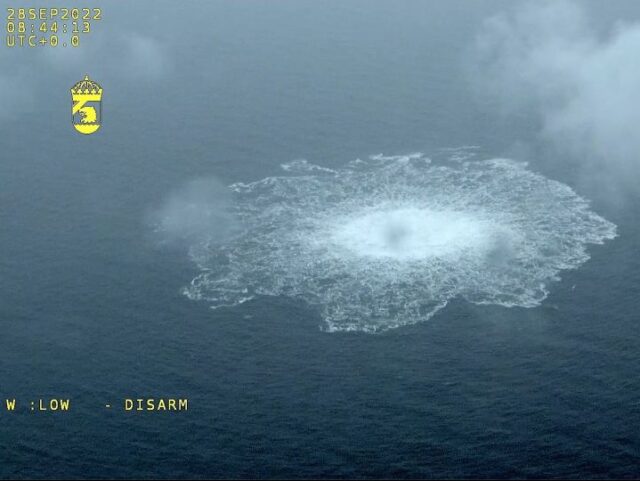The fractures of the Nord Stream pipelines in the Baltic sea were likely caused by “at least two detonations” of equivalent to “several hundred kilos” of explosives, a joint letter from Denmark and Sweden to the United Nations has said.
While the truth of the perpetrator of what is relatively universally claimed to be an act of sabotage or outright terror attack remains unsettled — although NATO members are pretty well decided Russia was responsible — the exact circumstances are still emerging.
It has been pretty well established that large blasts preceded the fracturing of several pipes of Nord Streams One and Two around the Danish Island of Bornholm, itself between Denmark, Sweden, Germany, and Poland. But now Sweden and Denmark, in a letter sent to the United Nations Security Council yesterday and made public today reveal the scale of the blast thought to be responsible for the damage.
“Denmark and Sweden would like to provide the following information regarding the explosions on the Nord Stream 1 and 2 pipelines”, the letter published by Swedish Foreign Minister Ann Linde began, which noted: “At least two detonations occurred underwater… probably corresponding to an explosive load of several hundred kilos”. The letter notes there is still gas inside the pipes which is venting into the sea and upwards into the atmosphere — a navigational hazard to passing ships and aircraft — and that this is expected to continue until the pipes empty on Sunday.
While the conclusion of the venting will, presumably, conclude the risk to passing ships — which have been warned to stay a considerably five nautical miles (five and a half miles) away in the congested waterway — the gas will have been displaced by seawater inside the Nord Stream pipes. As previously reported, there are concerns from within the German security community that allowing seawater to sit inside the pipes will allow corrosion to take place, risking the entire $11-billion infrastructure being rendered permanently useless.
The damage to the Nord Stream pipes was discovered early Saturday morning. While neither pipe was actually transporting gas from Russia to Europe at the time — both were at a standstill over Russia’s invasion of Ukraine this year — the blast has raised, again, concerns about Europe’s energy security this coming winter. Nord Stream has long been a controversial project, given the perception — latterly proved correct — that Gemrany becoming increasingly dependent on Russia for its energy needs would render the most powerful country in the Euripean Union unable to stand up to Russia, a malign actor.
U.S. President Donald Trump was literally laughed at for pointing this out in his time, yet U.S. policy on Nord Stream seems to have enjoyed some continuity in the Biden era with a spirit of scepticism over the pipeline. A February speech made by Joe Biden has enjoyed a surge in virality in recent days, with clips of the U.S. President vowing that if Russia invaded Ukraine, he had the tools at his disposal to “bring an end” to Nord Stream 2 being shared on social media.

COMMENTS
Please let us know if you're having issues with commenting.